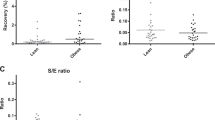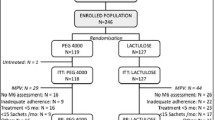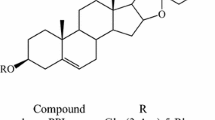Abstract
Although gastrointestinal toxicity is one of the most common side effects of anticancer therapy, the diagnosis and assessment of this toxicity still depend mostly on anamnestic data. Measurement of intestinal permeability is one of potential methods of non-invasive laboratory evaluation of gastrointestinal toxicity. The aim of the present study was to investigate intestinal permeability, vitamin A absorption, serum alpha-tocopherol, and urinary neopterin in patients with rectal carcinoma treated with chemoradiation. We have studied intestinal permeability, vitamin A absorption, serum alpha-tocopherol, and urinary neopterin in 17 patients with rectal carcinoma treated with chemoradiation. Urinary lactulose, mannitol, and xylose were measured by capillary gas chromatography, and serum alpha-tocopherol, retinol, retinyl esters, and urinary neopterin were determined by high-performance liquid chromatography. Lactulose/mannitol ratio was increased 5 and 6 weeks after the start of the treatment. Serum alpha-tocopherol was decreased significantly throughout the course of treatment, but no significant changes were observed in postprandial serum concentrations of retinyl esters or in the concentrations of urinary neopterin. A correlation was observed between baseline parameters of intestinal permeability and urinary neopterin. The measurement of intestinal permeability using the lactulose/mannitol test may represent a sensitive tool in the detection of changes associated with chemoradiation in patients with rectal carcinoma. The therapy is also associated with a decrease of alpha-tocopherol.

Similar content being viewed by others
References
Sauer R, et al. Preoperative versus postoperative chemoradiotherapy for rectal cancer. N Engl J Med. 2004;351:1731–40.
Wolmark N, et al. Randomized trial of postoperative adjuvant chemotherapy with or without radiotherapy for carcinoma of the rectum: National Surgical Adjuvant Breast and Bowel Project Protocol R-02. J Natl Cancer Inst. 2000;92:388–96.
Melichar B, Dvorak J, Hyspler R, Zadak Z. Intestinal permeability in the assessment of intestinal toxicity of cytotoxic agents. Chemotherapy. 2005;51:336–8.
Bjarnason I, Macpherson A, Hollander D. Intestinal permeability: an overview. Gastroenterology. 1995;1995:1566–81.
Uil JJ, et al. Clinical implications of the sugar absorption test: intestinal permeability test to assess mucosal barrier function. Scand J Gastroenterol. 1997;32:70–8.
DeMeo MT, Mutlu EA, Keshavarzian A, Tobin MC. Intestinal permeation and gastrointestinal disease. J Clin Gastroenterol. 2002;34:385–96.
Melichar B, et al. Intestinal permeability and vitamin A absoption in patients with chemotherapy-induced diarrhea. Am J Clin Oncol. 2008;31:580–4.
Urbanek L, et al. Optimization and validation of a high performance liquid chromatography method for the simultaneous determination of vitamins A and E human serum using monolithic column and diode-array detection. Anal Chim Acta. 2006;573–574:267–72.
Urbanek L, et al. Development and validation of a liquid chromatography method for the simultaneous determination of alpha-tocopherol, retinol and retinyl esters in human serum using a monolithic column for the monitoring of anticancer therapy side effects. J Sep Sci. 2006;29:2485–93.
Borel P, et al. Processing of vitamin A and E in the human gastrointestinal tract. Am J Physiol Gastrointest Liver Physiol. 2001;280:G95–103.
Melichar B, et al. Urinary neopterin in patients with ovarian cancer. Pteridines. 2006;17:145–53.
Melichar B, Hyspler R, Kalabova H, Urbanek L, Krcmova L. Gastrointestinal permeability—a parameter of possible prognostic importance in metastatic colorectal carcinoma. Pteridines. 2008;19:19–22.
Melichar B, et al. Serum alpha-tocopherol, retinol and neopterin during paclitaxel/carboplatin chemotherapy. Anticancer Res. 2007;27:4397–401.
Cermanova M, et al. Urinary neopterin and microalbuminuria in patients treated by low-density lipoprotein apheresis. Pteridines. 2005;16:174–83.
Kohout P, Cerman J, Bratova M, Zadak Z. Small bowel permeability in patients with cytostatic therapy. Nutrition. 1999;15:546–9.
Daniele B, et al. Effect of chemotherapy with 5-fluorouracil on intestinal permeability and absorption in patients with advanced colorectal cancer. J Clin Gastroenterol. 2001;32:228–30.
de la Maza MP, et al. Acute nutritional and intestinal changes after pelvic radiation. J Am Coll Nutr. 2001;20:637–42.
Vigneulle RM, Rao S, Fasano A, MacVittie TJ. Structural and functional alterations of the gastrointestinal tract following radiation-induced injury in the rhesus monkey. Digest Dis Sci. 2002;47:1480–91.
Melichar B, et al. Intestinal permeability in patients with chemotherapy-induced stomatitis. J Cancer Res Clin Oncol. 2001;127:314–8.
Harrison EH, Hussain MM. Mechanisms involved in the intestinal digestion and absorption of dietary vitamin A. J Nutr. 2001;131:1405–8.
Johnson EJ, et al. Evaluation of vitamin A absorption by using oil-soluble and water-miscible vitamin A preparations in normal adults and in patients with gastrointestinal disease. Am J Clin Nutr. 1992;55:857–64.
Debier C, Larondelle Y. Vitamins A and E: metabolism, roles and transfer to offspring. Br J Nutr. 2005;93:153–74.
McMillan DC, et al. The relationship between reduced vitamin antioxidant concentrations and the systemic inflammatory response in patients with common solid tumours. Clin Nutr. 2002;21:161–4.
Mayland C, Allen KR, Degg TJ, Bennet M. Micronutrient concentrations in patients with malignant disease: effect of the inflammatory response. Ann Clin Biochem. 2004;41:138–41.
McMillan DC, Sattar N, Talwar D, O’Reilly DS, McArdle CS. Changes in micronutrient concentrations following anti-inflammatory treatment in patients with gastrointestinal cancer. Nutrition. 2000;16:425–8.
Faure H, et al. 5-hydroxymethyluracil excretion, plasma TBARS and plasma antioxidant vitamins in adriamycin-treated patients. Free Rad Biol Med. 1996;20:979–83.
Jonas RC, et al. Plasma antioxidant status after high-dose chemotherapy: a randomized trial of parenteral nutrition in bone marrow transplantation patients. Am J Clin Nutr. 2000;72:181–9.
High KP, et al. Low plasma concentrations of retinol and alpha-tocopherol in hematopoietic stem cell transplant recipients: the effect of mucositis and the risk of infection. Am J Clin Nutr. 2002;76:1358–66.
Faber M, Coudray C, Hida H, Mousseau M, Favier A. Lipid peroxidation products, and vitamin and trace element status in patients with cancer before and after chemotherapy, including adriamycin. A preliminary study. Biol Trace Elem Res. 1995;47:117–23.
Kennedy DD, et al. Low antioxidant vitamin intakes are associated with increases in adverse effects of chemotherapy in children with acute lymphoblastic leukemia. Am J Clin Nutr. 2004;79:1029–36.
Delanian S, Porcher R, Balla-Mekias S, Lefaix JL. Randomized, placebo-controlled trial of combined pentoxifylline and tocopherol for regression of superficial radiation-induced fibrosis. J Clin Oncol. 2003;21:2545–50.
Pace A, et al. Neuroprotective effect of vitamin E supplementation in patients treated with cisplatin chemotherapy. J Clin Oncol. 2003;21:927–31.
Melichar B, Solichová D, Freedman RS. Neopterin as an indicator of immune activation and prognosis in patients with gynecological malignancies. Int J Gynecol Cancer. 2006;16:240–52.
Wachter H, Fuchs D, Hausen A, Reibnegger G, Werner ER. Neopterin as marker for activation of cellular immunity: immunologic basis and clinical application. Adv Clin Chem. 1989;27:81–141.
Melichar B, et al. Urinary neopterin in patients with advanced colorectal carcinoma. Int J Biol Markers. 2006;21:190–8.
Tatzber F, et al. Elevated serum neopterin levels in atherosclerosis. Atherosclerosis. 1991;89:203–8.
Weiss G, et al. Increased concentrations of neopterin in carotid atherosclerosis. Atherosclerosis. 1994;106:263–71.
Melicharova K, et al. Urinary neopterin in patients with diabetes mellitus and foot ulcers. Pteridines. 2007;18:128–31.
Melichar B, et al. Urinary neopterin, hemoglobin and peripheral blood cell counts in breast carcinoma patients treated with dose-dense chemotherapy. Anticancer Res. 2008;28:2389–96.
Reibnegger G, et al. Neopterin as a prognostic indicator in patients with carcinoma of the uterine cervix. Cancer Res. 1986;46:950–5.
Steinberg D. Oxidative modification of LDL and atherogenesis. Circulation. 1997;95:1062–71.
Keaney JF, et al. Vascular incorporation of alpha-tocopherol prevents endothelial dysfunction due to oxidized LDL by inhibiting protein kinase C stimulation. J Clin Invest. 1996;98:386–94.
Salonen JT, et al. Antioxidant Supplementation in Atherosclerosis Prevention (ASAP) study: randomized trial of the effect of vitamins E and C on 3-year progression of carotid atherosclerosis. J Intern Med. 2000;248:377–86.
Acknowledgments
This study was supported by the grant of the Internal Grant Agency of the Czech Republic NR9096-4 and Research Project MZO 00179906.
Author information
Authors and Affiliations
Corresponding author
Rights and permissions
About this article
Cite this article
Dvořák, J., Melichar, B., Hyšpler, R. et al. Intestinal permeability, vitamin A absorption, alpha-tocopherol, and neopterin in patients with rectal carcinoma treated with chemoradiation. Med Oncol 27, 690–696 (2010). https://doi.org/10.1007/s12032-009-9270-4
Received:
Accepted:
Published:
Issue Date:
DOI: https://doi.org/10.1007/s12032-009-9270-4




